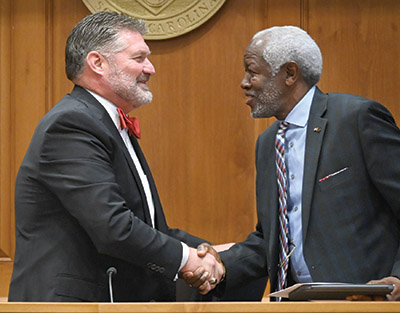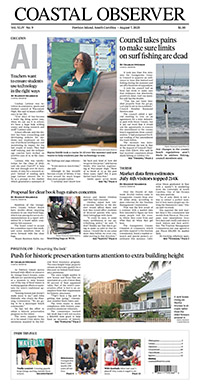Georgetown County
New council chairman says his focus in on zoning update

Clint Elliott took over as chairman of Georgetown County Council last week saying he wants the ability to direct the agenda to focus on issues such as the update of the zoning ordinance.
He replaced from Louis Morant, who served as chairman for four years after Elliott’s predecessor in Council District 1, John Thomas, was unable to muster support for a second term. Elliott is midway through his first term on council, as Morant was when he was elected chairman.
Elliott said he talked with Morant about the chairmanship.
Morant said Elliott didn’t have to twist his arm.
“I’m a team player,” Morant said.
The most important thing Elliott learned from watching Morant was “patience,” he said.
“He’s one of my favorite people,” Elliott added.
Council Member Stella Mercado was elected vice chairman, the position held by Lillie Jean Johnson, who didn’t run for re-election to council last year. Mercado represents District 6. This is the first time representatives for the Waccamaw Neck have held the two top spots on the council.
The chairman doesn’t have any more authority that the other six members, but he does get to set the agenda and keep it moving.
“You’re an arbitrator more than an advocate,” Elliott said. “You set the agenda and direct it.”
His priorities are adopting a wetlands ordinance and revising the zoning ordinance to meet the goals of the county comprehensive plan, which was updated last year several years behind schedule. Elliott and Mercado drew criticism during that process from constituents who said the updated land use plan will increase residential density.
“The tough part is not taking the grief, but things that weren’t true or half-truths and distortions,” he said.
Changing the zoning code will make a difference.
“We’re zoned for what nobody really wants,” Elliott said. That makes it hard to withhold approval for projects that meet the ordinance. “All we do in denying it is cost the taxpayers a lot of money” in lawsuits, he said.
Elliott said he has already met with attorneys at the S.C. Environmental Law Project, which provided the county with a draft wetlands ordinance. The county planning staff has said it also has a draft of an ordinance.
“Wetlands should be a case by case basis,” Elliott said. He doesn’t want someone to be able to fill wetlands on the Waccamaw Neck and mitigate that by preserving wetlands elsewhere in the county that wouldn’t be developed anyway.
Although Elliott lives in Murrells Inlet he grew up in Pleasant Hill, which gives him a rare perspective on issues across the county. Getting residents to see common needs can be frustrating, he said.
That was driven home last year when the council put a capital project sales tax on the ballot. Elliott said he got questions from constituents about why their sales tax should benefit people in the rural areas.
“Because that’s where the needs are,” Elliott told them.
He said he was shocked that the tax passed, even if only by a narrow margin, while a local option sales tax that would have provided a property tax credit failed.
“We failed,” Elliott said. “We didn’t explain it good enough.”
He expects the council to put the local option tax back on the ballot in 2026.
Another item on Elliott’s agenda is starting talks with the Army Corps of Engineers about raising the height of the Murrells Inlet jetties to keep pace with rising sea level.
“It’s not working like it’s supposed to,” he said.
Water flowing over the jetties is carrying silt into the inlet. The county is currently seeking state and federal permits for dredging that will be funded by the state.
Elliott is also reading up on Roberts’ Rules of Order, something he last studied as a student at Clemson University.
“He’ll do well,” Morant said.




